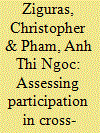| Srl | Item |
| 1 |
ID:
134162


|
|
|
|
|
| Publication |
2014.
|
| Summary/Abstract |
One of the limitations of research on global educational mobility has been the primary classification of key participants - students and educational institutions - in national terms. This paper tests the challenges involved in such methodological nationalism by examining the provision of cross-border education in one city. As Vietnam's commercial centre, Ho Chi Minh City (HCMC) has experienced rapid transformation over the past two decades as the country has moved steadily from a state-directed to a more market-driven and globally integrated economy. Since the late 1990s there has been a parallel growth in cross-border higher education in HCMC, through the outbound mobility of students and the provision of foreign programmes by international partnerships and branch campuses. Drawing on available data supplemented with insights gleaned from interviews and existing literature, this paper develops a methodology for identifying and quantifying the key features of each form of domestic, overseas and transnational provision. We estimate that around 6% of HCMC's tertiary students are studying overseas and between 2% and 3% in foreign programmes delivered in the city. The rates of enrolment in overseas and transnational programmes by students in HCMC are thus far higher than for Vietnam as a whole, but still considerably lower than in those well-established cross-border education hubs, Hong Kong and Singapore. We argue that concerns about the growth of private education and inequalities in access may continue to limit the growth of transnational provision in HCMC.
|
|
|
|
|
|
|
|
|
|
|
|
|
|
|
|
| 2 |
ID:
134166


|
|
|
|
|
| Publication |
2014.
|
| Summary/Abstract |
A central theme in the literature on transnational migration is the embeddedness of such movement in social networks and the utilisation of social capital in facilitating mobility. This case study on overseas Chinese students and mainly non-Chinese foreign students studying at a top university in Taipei brings in the notions of cultural capital and city. It investigates the ways social networks shape the destination choices of these two groups of students, and how their patterns of adjustment in the host milieu and attachment to the host city are affected by the transnational migration network (and the lack of it), embodied cultural capital and different host imaginaries constructed by the Taiwan government. The results show that these two groups of international students differed in their reliance on transnational migration networks in making destination choices prior to migration. Furthermore, the different forms of social networks and the differential social and cultural capital embedded in their respective groups, along with the distinctive host images that were constructed by the Taiwan government to cater for these two groups, shaped their overseas experiences and attachment to the city of Taipei in distinctive ways.
|
|
|
|
|
|
|
|
|
|
|
|
|
|
|
|
| 3 |
ID:
134165


|
|
|
|
|
| Publication |
2014.
|
| Summary/Abstract |
This paper analyses the impact the phenomenal growth (2002-2009) and rapid decline (2010-2012) of Indian student numbers has had on the city of Melbourne. Specifically addressing the way the debate developed over the allegedly racially motivated attacks on students in 2009 the paper examines how conflicting narratives on Indian students could emerge presenting them as 'victims' and/or 'profiteers'. Making use of an analysis of over a thousand media reports as well as drawing on ethnographic material the paper argues that the way the debate about the racist character of the attacks unfolded in popular media is revealing of the way the growth in Indian students in Melbourne has been experienced and perceived over time. In particular the entanglement of education and migration in Australia, allowing Indian students to become permanent residents by graduating from low-quality institutions, contributed to the perception of them being low-skilled migrants and as such 'profiteers'. As a result the paper not only shows how a rapidly growing and highly commercial education industry was able to influence the dynamics and socio-cultural make-up of the city of Melbourne but also how the entanglement of education and migration produced a volatile situation with ultimately far reaching social and economic consequences for the city.
|
|
|
|
|
|
|
|
|
|
|
|
|
|
|
|